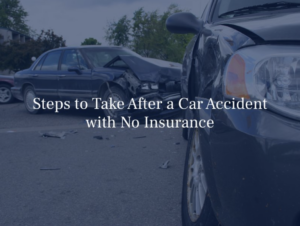Car Crash Defense - No Bodily Injury Coverage

Introduction
In Florida, bodily injury liability insurance is not mandatory, but it can have significant consequences if you're at fault in a car crash and do not have it. Here's a breakdown of what could happen in such a scenario:
1. Florida's Insurance Requirements
- Personal Injury Protection (PIP): Florida requires drivers to have Personal Injury Protection (PIP) coverage, which covers medical expenses for the driver and passengers in their own car, regardless of fault. The minimum required amount is $10,000.
- Property Damage Liability (PDL): Florida also mandates Property Damage Liability (PDL) insurance, which covers damage you cause to someone else’s property (e.g., their vehicle, fence, etc.). The minimum required amount is $10,000.
However, bodily injury liability insurance (which covers the medical expenses of other people if you're at fault for the accident) is not required for most drivers in Florida. But if you do not have it and you're at fault in a crash, there are some serious financial and legal consequences.
2. What Happens If You're at Fault Without Bodily Injury Insurance?
If you do not have bodily injury liability insurance and you are at fault in an accident that causes bodily injury to another person, you could face the following:
a. Personal Liability
- If the other driver or passengers are injured and you are at fault, they could sue you personally for damages (including medical bills, lost wages, pain, and suffering).
- Without bodily injury liability insurance, you may be personally liable for paying these damages out of your own pocket, potentially resulting in a judgment against you. This means that a court could order you to pay the injured party’s medical bills, lost wages, and other related expenses.
b. Financial Consequences
- Lawsuit Risk: If you don’t have insurance and you are sued, the injured party could take legal action to recover their losses. This could result in wage garnishment, liens on your property, or other collection actions if a court judgment is entered against you.
- Personal Assets at Risk: Without bodily injury insurance, any assets you own—such as savings, vehicles, or property—could be at risk if you're required to pay for the damages.
c. License and Registration Consequences
- Suspension of License and Registration: Florida may suspend your driver’s license and vehicle registration if you're at fault in an accident and you don't have the required bodily injury liability insurance. If you’re unable to pay for the injuries caused, the state could issue a "no-fault" suspension of your driver’s license until you show proof of financial responsibility.
- SR-22 Requirement: If you are found to be at fault and you do not have insurance, you may be required to file an SR-22 form (a certificate of financial responsibility) with the state. This typically applies to drivers who have had their licenses suspended or have been involved in serious traffic violations. The SR-22 would need to be maintained for a period, usually 3 years.
d. No Protection for Others
- If you cause an accident, your passengers or other drivers would not be able to claim against your insurance for their bodily injuries (since you don’t have bodily injury coverage). They would need to rely on their own insurance policies (e.g., their own personal injury protection or health insurance), or they might attempt to sue you personally.
3. Can You Still Drive?
While PIP and PDL insurance are mandatory in Florida, you can legally drive without bodily injury liability insurance. However, if you're found at fault in an accident that causes bodily injury, you could face the serious consequences mentioned above, including financial liability, lawsuits, and suspension of your driver’s license.
4. What Are Your Options?
If you're driving in Florida without bodily injury liability insurance and are at fault in a car accident, here are your options to mitigate the situation:
- Consider Purchasing Bodily Injury Liability Insurance: While it's not required by law, having bodily injury liability insurance is highly advisable. It protects you financially and legally in the event of an accident where you are at fault and cause injury to others. Coverage limits can vary, but typical policies might include coverage of $25,000 per person and $50,000 per accident.
- Set Aside Savings for Potential Liability: If you don’t have bodily injury insurance, you might want to set aside funds or have an emergency savings fund to cover potential liability if you're at fault.
- Explore Underinsured or Uninsured Motorist Coverage: If you're worried about other drivers who may be at fault but do not have sufficient insurance, you could consider purchasing uninsured/underinsured motorist (UM/UIM) coverage. While this won’t protect you if you're at fault, it can be useful if the other party is uninsured or underinsured.
- Consult with an Attorney: If you're involved in an accident and do not have bodily injury insurance, it’s wise to consult with a legal professional to understand your rights and potential defenses if a lawsuit is filed.
Summary of Key Points:
- Bodily Injury Liability is not required by Florida law for drivers, but it is highly recommended.
- If you're at fault in a car accident without bodily injury insurance, you could face personal liability for medical expenses, pain and suffering, and other damages.
- The injured party may sue you, and you may be personally liable for the damages.
- License suspension and financial responsibility requirements (SR-22) can apply if you're at fault and uninsured.
- You should consider purchasing bodily injury liability insurance to protect yourself financially.
If you have been in a car crash and have further questions or need more specifics on Florida’s insurance laws, feel free to contact us for a free case evaluation!
